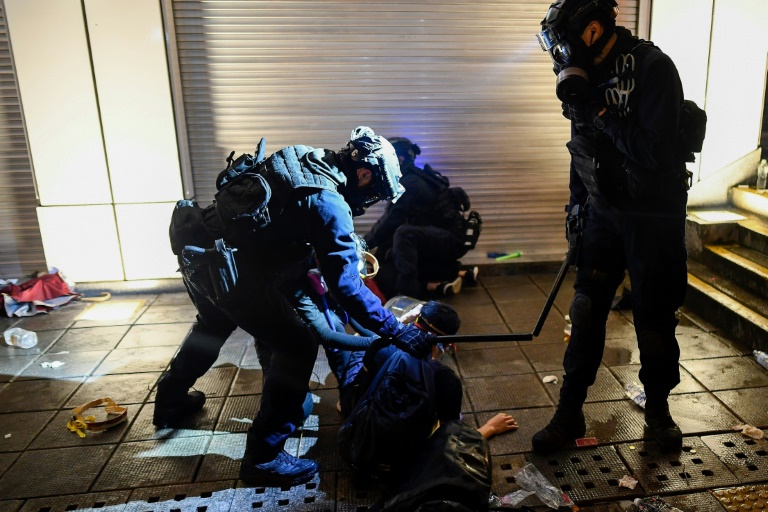
Police in Hong Kong fired volleys of tear gas Sunday at thousands of pro-democracy protesters who defied warnings from authorities to hit the streets for the tenth weekend in a row.
The protesters staged a second night of “hit-and-run” rallies, splitting into small groups that scattered across the city to set up temporary roadblocks and face off against riot police.
Police denied their requests for permits to stage a march from the city’s Victoria Park and in the Sham Shui Po neighbourhood, but the protesters gathered anyway.
By early Sunday afternoon, thousands were in Victoria Park, braving hot and humid conditions.
“The police should try their best to maintain public security instead of rejecting our request to march,” said a 25-year-old protester who gave only her family name, Wong.
“We’re still here… We won’t worry that much about illegal assembly. We still have our rights,” she told AFP.
 AFP / Manan VATSYAYANA The protesters staged a second night of “hit-and-run” rallies, splitting into small groups that scattered across the city to set up temporary roadblocks and face off against riot police
AFP / Manan VATSYAYANA The protesters staged a second night of “hit-and-run” rallies, splitting into small groups that scattered across the city to set up temporary roadblocks and face off against riot policeIn Sham Shui Po, they used metal fencing and plastic ties to construct makeshift barricades and block the road near the local police station, shining blue lasers at the building as officers held up a flag warning the crowd to disperse.
A woman ran across the stretch of the no-man’s land between the two sides, clutching an orange shopping bag as she tried to avoid the confrontation.
Shortly afterwards, protesters threw bricks and police began firing tear gas.
‘The last hope’
Other demonstrators blocked roads in Wan Chai, where police headquarters is located, and the Causeway Bay shopping district, chanting “reclaim Hong Kong, revolution of our times”.
 AFP / Manan VATSYAYANA Demonstrators have vowed to continue protests in Hong Kong despite a warning from the city’s leadership that she would not bow to their demands
AFP / Manan VATSYAYANA Demonstrators have vowed to continue protests in Hong Kong despite a warning from the city’s leadership that she would not bow to their demands“There is no chance of retreating, and as a Hong Konger, this is the last hope we see of being able to achieve democracy,” said a 20-year-old protester who gave his last name as Lam.
“We still love Hong Kong and we think Hong Kong still has a chance of obtaining a democratic system.”
Elsewhere, scuffles broke out between pro-Beijing residents and unidentified bystanders — as well as media — with police intervening in some cases to pull people apart.
Protesters also faced off against police in the Kwai Fong train station, with the demonstrators using fire extinguishers and a water hose against riot officers who fired tear gas into the terminal.
The apparently random and constant movement of protesters throughout the city reflected the mantra of flexible action that they have adopted dubbed “be water.”
 AFP / Manan VATSYAYANA Scuffles broke out during the latest Hong Kong protesters between pro-democracy activists and pro-Beijing residents
AFP / Manan VATSYAYANA Scuffles broke out during the latest Hong Kong protesters between pro-democracy activists and pro-Beijing residents“We are leaderless, and practically everything is being decided by those on the front lines, and we follow along,” said a protester who gave his surname as Cheung.
“I think our previous tactics of staying in one place led to many arrests and injuries,” added another 17-year-old student activist who gave only his surname, Chan.
“We need to ‘be water’ to avoid injuries.”
‘Internal perils’
But the tactic was not enough to keep everyone safe, with at least nine people sustaining injuries during the hours of confrontations, a government official said.
One was in serious condition, and a second in stable condition, the official added. It was not immediately clear if the number included a police officer who authorities said suffered burns from a petrol bomb thrown by demonstrators.
 AFP / Anthony WALLACE Officials said at least nine people sustained injuries in the Hong Kong protests, including one in serious condition
AFP / Anthony WALLACE Officials said at least nine people sustained injuries in the Hong Kong protests, including one in serious conditionPolice made arrests at several locations throughout the day, with protesters accusing plainclothes officers of dressing in the movement’s signature black to infiltrate their ranks and detain activists.
The atmosphere was markedly different from the peaceful sit-in that protesters staged for a third and final day at the airport, billed as way to explain the movement to arriving visitors.
The demonstrations that began more than two months ago in opposition to a bill allowing extraditions to mainland China have morphed into a broader bid to reverse a slide in democratic freedoms in the city.
The movement has been seen as the biggest threat to Beijing’s rule of the semi-autonomous Chinese city since its handover from the British in 1997.
The city’s Beijing-appointed leader Lam has ruled out granting the protesters’ demands, which include a full withdrawal of the now-suspended extradition bill, direct election of the city’s leader and an investigation into police violence.
On Saturday, she addressed students at Hong Kong army cadets camp and warned that the city was “suffering from external worries and internal perils”.
“Every person who cherishes Hong Kong and loves peace should work hard together and safeguard our beautiful home.”
yz-cla-ey-sah/fox




